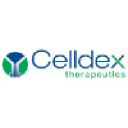Companies
Discover all trending biotech companies
Discover all trending biotech companies

Company Research Platform
Annual Revenue
$ 700,000
Global Employees
186
This segment focuses on the research and development of antibody-based therapeutics for various cancers. Celldex utilizes its proprietary technologies to develop monoclonal and bispecific antibodies that target specific cancer cells and modulate the immune system to fight tumors. Research and development activities include preclinical studies, clinical trials, and regulatory submissions. The company's lead product candidates, such as CDX-527, are designed to harness the power of the immune system to combat cancer. This segment addresses the significant unmet medical needs in oncology, aiming to improve patient outcomes and survival rates. Celldex's market positioning is based on its innovative approach to cancer immunotherapy, and its competitive advantage lies in its pipeline of novel antibody-based therapies. Future opportunities include expanding the clinical development of its product candidates and exploring new therapeutic applications. Partnerships and collaborations with research institutions and pharmaceutical companies are crucial for advancing the development and commercialization of its oncology therapeutics.
This segment is dedicated to the development of antibody-based therapeutics for inflammatory diseases. Celldex's research and development efforts focus on identifying and targeting key pathways involved in inflammation. The company's lead product candidate in this area is barzolvolimab, which is being evaluated in Phase 2 clinical trials for atopic dermatitis. The technologies employed include monoclonal antibody development and clinical trial design. The therapeutic areas covered include atopic dermatitis and other inflammatory conditions. The patient impact is focused on improving the quality of life for individuals suffering from these debilitating diseases. Celldex aims to establish a strong market position by offering innovative treatments for inflammatory diseases. Competitive advantages include the company's expertise in antibody engineering and its focus on unmet medical needs. Future opportunities involve expanding the clinical development of barzolvolimab and exploring new indications. Regulatory and clinical aspects are critical, with a focus on obtaining FDA approval for its product candidates. Partnerships and collaborations with dermatological and immunological research institutions are essential for advancing the development and commercialization of its therapeutics.